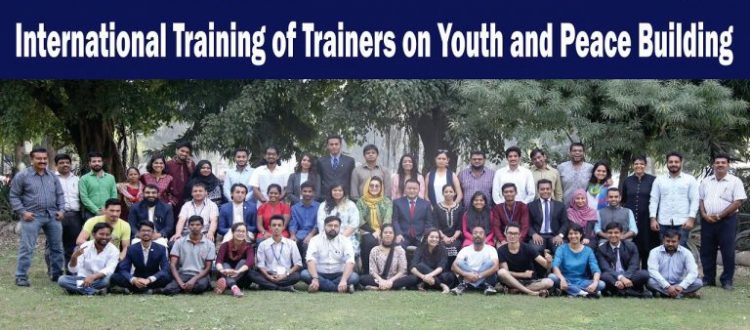Youth, peace and conflict transformation – empowering youth from South Asia
Youth for Peace International, a UNOY Peacebuilders member organisation, the Rajiv Gandhi National Institute for Youth Development, and the Commonwealth Youth Peace Ambassadors Network (CYPAN) gathered young peacebuilders from across South and South-East Asia to engage with themes including youth, peace and conflict management & transformation at a training of trainers in Chandigarh in October 2016.
| Suggested Reading | Conflict Background | GCCT |
By Mridul Upadhyay and Omang Agarwal
“I lost my father 9 years ago. And when I chose cycling and music to empower young girls, I didn’t know it’ll make me a nominee for Nobel Peace Prize 2015”. – Zhala Sarmast, 17 years old, Afghanistan
“I had to leave my home, family and country to save my life from violence in communal riots. And now I am trying to search a meaning of this life by helping my fellow refugees.” – Ali Johar, 21 years old, Refugee in India from Myanmar
Thirty-seven amazing young peace-builders such as these, from India, Afghanistan, Nepal, Bangladesh, Sri Lanka, Myanmar, Maldives and Malaysia attended a five-day residential training aimed at empowering young minds from South Asia on themes of Youth, Peace and Conflict Management & Transformation. The International Training of Trainers (ToT) on Youth and Peacebuilding, from 18 – 22nd October 2016, was hosted by Rajiv Gandhi National Institute of Youth Development (RGNIYD) Regional Centre, and took place in Chandigarh, India. The event was held in collaboration with Youth for Peace International (YFPI) and the Commonwealth Youth Peace Ambassadors Network (CYPAN).
The United Nations Security Council (UNSC) adopted Resolution 2250 in December 2015. This brought to light the importance of engaging youth in problems of conflicts and security and also aims to empower them in all possible ways in the peacebuilding processes. With this as the founding stone, the organisers are motivated to train young people and to interest them in community welfare activities and peaceful coexistence.
The training programme was full of experience sharing, learning and analysing conflict situations and then acting upon them to actually build a culture of peace across the globe. The training focused on building up a clear body of theory, and on developing skills and greater understanding of organising, planning, facilitating, evaluating and following-up on conflict transformation and peacebuilding workshops. The goal was that by the end of the training the participants will have improved competencies in all the critical areas.
Various core values such as inclusion, no competition, safety (physical and emotional), role-modelling, and fun were introduced through “Play for Peace” activities. The message and aim was to make the participants recognise that competition does not at all times bring out the best in you but rather seeing people having fun just like yourself yields greater results. This also aimed at breaking stereotypes and bringing people together to promote relationships in places that suffer from a history of cultural, racial or religious tensions, bullying, and discrimination, and to inspire community development initiatives that improve the quality of life of those in need.
The facilitators also introduced the theory of challenge by choice, Relationship and Risk graphs, the five stages of the relationship, theory of Conflict and Violence, Compatible and Incompatible goals and behaviours, types of conflicts (No, Latent, Surface and Open Conflicts), self-personality analysis (Assertive, Altruistic and Analytic) and Conflict Management styles (Directing, Compromising, Avoiding, Co-operating and Harmonising).
The participants also facilitated sessions in pairs on their chosen theme, implementing various lessons from the sessions. It helped them to practise in a safe environment and get proper feedback for improvisation. Reflection sessions, active listening sessions and safe zone (home group) discussion sessions gave the participants an environment to share “their” stories. The session held great emotional value as many participants were in tears while sharing their stories. The days usually ended on a lighter note with all delegates singing and dancing to popular folk songs from different countries, facilitating close bonding between participants.
The ToT aimed both at training the young people to create a tolerant and peaceful environment in their communities and also of forming larger youth networks in their communities and countries so that efforts can be made more efficient and that stakeholders engaged in involving young people in peace processes consider youth not just as beneficiaries but also as partners. Some participants will become parts of their country CYPAN teams and start taking part in activities to sustainably engage greater masses of young people in their work to achieve, promote and preserve peace in societies and communities. After the training, these Global Peace Ambassadors will also be supported to steer the launch and implementation of UNSC Resolution 2250 in their countries over the course of time.
Mridul Upadhyay and Omang Agarwal are both part of Youth for Peace International.
The United Network of Young Peacebuilders (UNOY Peacebuilders) is a member of the Global Coalition for Conflict Transformation, comprised of organizations committed to upholding and implementing the Principles of Conflict Transformation.
This piece was originally published on the UNOY blog and is available by clicking here. The views expressed in this piece do not necessarily reflect those of TransConflict.



















